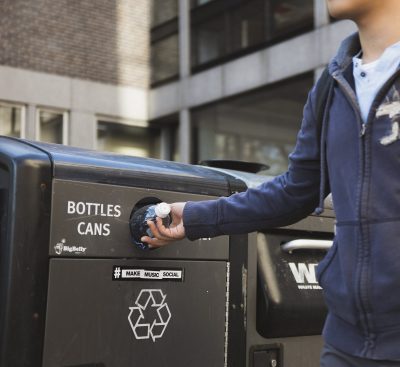Limited resources on our planet and the threats of climate change call for steps to be taken to avoid major disruptions to society.

“I want my kids to grow up on a planet that is similar to the planet I grew up on,” said Dennis Carlberg, Boston University’s associate vice president of Sustainability, after leading a Green Campus Tour on Friday afternoon.
At Boston University, this call to action is clear.
BU hosted a Green Campus Tour on Friday in conjunction with Friends and Family Weekend, allowing parents and students to learn more about what the University is doing to lead the transition to a carbon-free city and a more sustainable, zero-waste future on campus.
BU Sustainability Director Lisa Tornatore also led the tour, along with students Matt Tate, a resident sustainability leader, and Taylor Reed, a BU Sustainability intern.
The Green Campus Tour, which had been conducted in past years before the COVID-19 pandemic limited in-person gatherings, began in front of the Sargent College of Health and Rehabilitation Sciences.
As they walked, tour attendees were able to get an up-close look at the new building for Data and Computer Sciences currently under construction, and stopped in front of the Dahod Family Alumni Center, the BU Beach and the George Sherman Union.
At each stop on the tour, Carlberg and Tornatore discussed different ways the University is investing in sustainable practices and the importance behind those practices. They also elaborated on how BU plans to reach its goals for a green campus, specifically the University’s divestment from fossil fuels, which was announced last month.
“The first order of business is to reduce energy consumption through energy efficiency,” Carlberg said during the tour of the construction of the new Center for Computing & Data Sciences.
He explained that the building will be heated through a geothermal system, which allows the building to be free of fossil fuels. Other environmentally conscious features of the new building include multiple green rooftop spaces and a redesign of the alleyway behind the building to make it more pedestrian-friendly.
Another stop on the tour was in front of the GSU, where Carlberg and Tornatore discussed the different initiatives taken regarding food waste and restaurant operations — for example, the addition of new trash and recycling signage at the bins to divide waste.
“There are things that we have to invest in,” Carlberg said during the tour, “but the benefits outweigh those [investments] over time.”
Emily Chung, a freshman in Sargent studying nutrition, said she likes the different food waste receptacles because they are one of the first instances that individuals can divert waste.
“I feel like [sustainability] is important to everyone since we live on this Earth,” Chung said. “We need to protect it.”
Parents on the tour also noted their concerns about a sustainable future at BU. Bina Surti and Sudhakr Tumuluri are the parents of a BU freshman, and they both noted the importance of sustainability at BU and in their daily lives.
“Where we live is very sustainable,” Surti added. “We believe in recycling. So, it really interests me for our future, what we can do as a whole.”
Surti and Tumuluri also noted that BU’s sustainability initiatives were an important part of their daughter’s decision to attend BU — one of her application essays was about certain aspects of sustainability.
Tour attendees were educated on the pertinence and significance of investing in a green campus. Carlberg said in an interview that it’s important to reduce the impact of climate change as much as possible.
“It’s so important that we deal with climate change as quickly as possible,” Carlberg said. “The whole effort now is to minimize those impacts over time, not eliminate them, we can’t eliminate them, but we want to minimize them.”
This article previously stated that the new recycling and food waste bins in the GSU yielded a 75 percent recycling rate. Carlberg later clarified that specifically the signage for the bins is new, and the statistic is outdated. The article has been updated to reflect these changes.













































































































Hessann Farooqi • Oct 26, 2021 at 6:25 pm
Love to see BU continuing to lead on sustainability, on campus (and off campus with the BU Wind farm in South Dakota).